It seemed like a good idea, at the time, earlier this year. The Idaho Legislature rejected school science standards involving climate change.
“The standards said humans are bad – basically, that’s what it said, humans are bad, didn’t talk about any mitigating factors, any science to describe what we can do to make things better,” said Rep. Scott Syme (R), the leader of the drive against the five climate change science standards.
The first of the five standards Syme doesn’t like told teachers to “ask questions to clarify evidence of the factors that caused the rise in global temperatures over the past century” and went on to cite examples of those factors including human activity.
“Emphasis is on the major role that human activities play in causing the rise in global temperatures,” the paragraph concluded.
The second standard is “Human Impacts on Earth Systems.”
It begins by stating, “Human activities have altered the biosphere, sometimes damaging or destroying natural habitats and causing the extinction of other species.”
Another standard claimed human activity is “having adverse impacts on biodiversity through overpopulation, overexploitation, habitat destruction, pollution, introduction of invasive species and climate change.”
Not only do the five standards blame humans for global warming, but teachers are also instructed to tell students that global climate models show changes “depend on the amounts of human-generated greenhouse gases added to the atmosphere each year and by the way in which these gases are absorbed by the ocean and biosphere.”
The Idaho Department of Education is asking state residents for help to rewrite those standards to make them more palatable to the legislature.
It was the House Education Committee that erased the five sections on climate change from the state’s science standards. The Senate Education Committee didn’t like that. Neither did Jen Pierce, a Boise State University geosciences professor.
“Ice caps don’t have a political agenda, they just melt. Forest fires don’t have a political agenda, they just burn,” Pierce said during the Senate committee’s hearing. “Scientists don’t have a political agenda. We are just trying to educate the people about the state of our planet and what we are doing about it.”
But when their counterparts in the House refused to bend, the Senate Education Committee buckled and went along with the House decision.
The Spokesman-Review reported most of the people who attended Idaho Department of Education public hearings to get input on rewriting the standards spoke for the rejected text.
Democrat Rep. Ilana Rubel held an informal discussion on the climate change standards. More than 650 people attended, filling the largest hearing room in the state Capitol and four overflow rooms.
“This is critically important to our economy and to our quality of life, and to be stripping it out of our (science) standards is moving in exactly the wrong direction,” Rubel said during the hearing. “This is not a matter on which there is scientific doubt.”
Glenn Branch, director of the National Center for Science Education, a group that defends the teaching of climate science in America’s schools, said legislatures in Iowa, Kentucky, Oklahoma, and Michigan have heard the arguments and rejected attempts to erase climate change from textbooks.
“I can confidently say that in no other state has the legislature taken it upon itself to engage in such a wholesale deletion of content about climate change from a proposed set of state science standards,” Branch told the Post Register. “I can with equal confidence say that the deletion is scientifically unwarranted.”
The Heartland Institute not only disagrees with Branch’s conclusion concerning the scientific reality of climate change, but it is also flooding Idaho teachers’ mailboxes with a free book that makes the case that there is another side to the story of global warming.
Close to 200,000 copies of a Heartland Institute book, Why Scientists Disagree About Global Warming, will be mailed not only to teachers in Idaho but also to high school and college science teachers across the nation.
“I am writing to ask you to consider the possibility that the science in fact is not ‘settled,’” Lennie Jarratt, manager of the Center for Transforming Education, wrote in a cover letter included with each book.
“If that’s the case,” Jarratt added, “then students would be better served by letting them know a vibrant debate is taking place among scientists on how big the human impact on climate is, and whether or not we should be worried about it.”









Join the conversation as a VIP Member